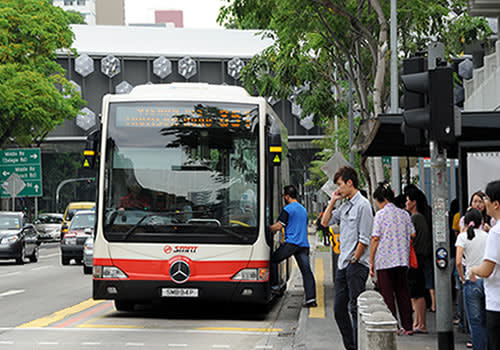Nationalised transport system has its downsides: Minister Lui

Transport Minister Lui Tuck Yew says that while a nationalised public transport system might seem attractive, it has serious implications.
His comments in a Facebook posting came a day after the Workers' Party reiterated calls for a nationalise public transport.
On Monday, public transport operators SBS Transit and SMRT submitted their proposals to the Public Transport Council (PTC) to seek an increase in fares -- both bus and train -- by 2.8 per cent.
Operators argued that they continue to face increasing costs despite efforts to manage costs and increase productivity.
Entering the fray of debate, the minister noted that while nationalising the public transport system might appear to be an attractive solution, it has its downsides.
He pointed out that this idea would result in commuters and taxpayers -- those who do not take public transport -- paying more, and possibly, for a poorer level of service over time.
Minister Lui explained that if public transport were to be nationalised, operators would be dependent on government funding as well as operate on a cost recovery basis. This he added, would not spur them to lower transport costs.
Instead, costs increases will be transferred to commuters who are then required to pay higher fares for the same level of service.
"Not only would people have to pay more, nationalising the operators could result in a stagnation of service quality or efficiency over time," he added.
However, he noted that the profit incentive of commercial enterprises is a more viable option as it promotes efficiency and productivity improvements.
Commenting on whether the two operators should be making substantial profit, Minister Lui said it is not unreasonable for them to gain fair returns from the investments required to sustain their operations and invest in future public transport needs.
Commuters' interests will be safeguarded
Even if the transport services are being run by commercial enterprises, Minister Lui said there are measures in place within his ministry which will ensure that commuters' interest are being safeguarded.
He highlighted that there is a "robust framework" to regulate bus and rail service levels and operating performance standards so that public transport operators (PTO) do not pursue profit at the expense of commuters.
The minister added that the Land Transport Authority (LTA) will also continue to collaborate with the PTOs to deliver improvements to the transport system.
He went on to comment on how fares are being reviewed and said that the PTC regulates fares based on an adjustment formula which takes into account factors such as the Consumer Price Index (CPI) and average national wage increases.
The formula protects commuters by capping fare increases, which means PTOs are not able to simply pass their cost increases to the public.
In an attempt to allay fears of a fare hike, Minister Lui said that as in previous years, the PTC will have to examine the operators proposals, taking into concern the interests of commuters and sustainability of the transport system.
"In fact, there have been some years when the PTC approved fare increases that have been less than what the PTOs proposed but we should let the PTC deliberate on this properly and make its decision," he said.
PTC to review fare adjustment formula
Meanwhile, the PTC will review the fare adjustment formula after 2012 when the validity of the current formula ends.
Chairman of the Government Parliamentary Committee (GPC) for Transport Cedric Foo had called for the review days after the transport operators submitted their proposals for a maximum fare adjustment.
The Ministry of Transport said the review is meant to take into concern the interest of commuters and long-term viability of the public transport operators.
Since 2005, the fare adjustment formula has been based on the fare review mechanism as recommended by the GPC-led Fare Review Mechanism Committee, it added. The ministry also said that the fare formula is not meant to be static.

